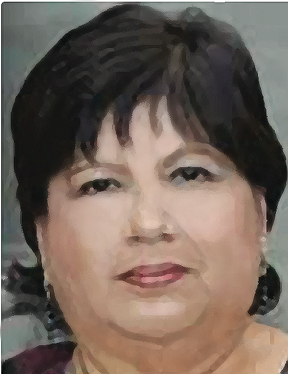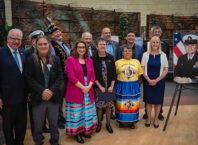 The controversial departure of the executive director of Women of Nations has sparked public outcry over the decline in American Indian representation within the organization.
The controversial departure of the executive director of Women of Nations has sparked public outcry over the decline in American Indian representation within the organization.
ctivists supporting former executive director Norma Renville argue that she was fired as part of a larger attempt by the organization’s board of directors to move the agency away from its American Indian-specific mission. Many who spoke at a recent community meeting said that the situation at Women of Nations parallels the larger history of Native people being denied sovereignty and basic rights by white Americans.
Activists have also called attention to the majority non-American
Indian composition of the agency’s board of directors. In recent weeks,
the debate over Women of Nations has grown ever more confusing, as some
activists conflate the departure of Renville with the concerns about
American Indian representation. Meanwhile, others argue that Renville
should have been fired, but that the board needs significantly more
Native members.
Renville co-founded Women of Nations, which operates several programs, including Eagle’s Nest, a battered women’s shelter providing American Indian-focused services, in 1982. She served as executive director for seven years. During that time, she said, she spearheaded extensive renovations and expanded culturally specific events and practices. Renville said that she was satisfied with her job until several months ago, when, she said, board members held meetings to discuss their grievances against her while she was out on medical leave for a broken wrist.
During a recent interview, Renville chronicled the weeks leading up to her departure from the agency. Since board members and the interim executive director either declined to comment on Renville’s departure or did not respond to phone and email interview requests, the exact chronology of events and the details of specific grievances against Renville could not be verified, except via copies of various emails and letters obtained through Renville.
According to sparse minutes obtained from a January 8th board meeting, directors discussed how to temporarily manage the organization during Renville’s leave. Directors also discussed an “Executive Director 6 Month Action Plan,” which board members planned to review with Renville when she returned. The meeting then went into closed session to address a “grievance” that board member John Plano voiced concerning Renville. Specific information about the grievance was not included in the minutes. Renville stated that the board never brought a formal grievance against her or informed her as to the specific nature of the complaints. Reached via telephone, Plano declined to comment.
In the meantime, medical complications, verified by medical records, delayed Renville’s return to work for several weeks. A February 13th letter sent to Renville from Women of Nations’ board president Carla Thompson Kurtz states that Renville has been performing significant work duties while on medical leave, in violation of board instructions. Renville said she kept the board notified of changes in her medical condition and only communicated infrequently with employees, but immediately upon her return, Renville said, she met with board members Pat Johnston and Plano, who informed her that she was not allowed to resume her work duties because they felt that she had not kept the board fully informed.
The board of directors presented Renville with a “Management Performance Improvement Plan,” demanding dozens of changes, including taking steps to prevent a hostile work environment and providing updated information on program services and finances.
A week later, Renville said, she met with the board’s executive committee. At that meeting, Renville claims, she asked the board to consider “an amicable separation.” At the same time, Renville gave the board her work cell phone, building keys, and agency check card. However, in a recent interview, Renville states that she did not resign at the meeting, and that she only handed over the agency’s possessions due to the advice of an attorney she consulted who suggested that she do so to prevent “allegations of impropriety.” Renville sent an email to the board on March 12 clarifying this.
On March 13, Women of Nations issued a letter to employees stating that Renville resigned. “She is leaving a strong legacy of both volunteer leadership rising to meet pressing community needs and a vision of service embedded in American Indian principles,” the letter states.
At the same time, sources say, a separate memo appeared next to the employee time clock stating that Renville was no longer allowed on the facility premises and if any staff saw her, they needed to notify the administration right away.
MUID and community react
In the months since Renville left Women of Nations, dozens of members of the American Indian community have voiced outrage over what they believe to be her forced departure from the organization. The loudest objections have come from Metropolitan Urban Indian Directors or MUID (a loose coalition of local American Indian organization leaders) despite the conflict of interest – Renville is co-chair of MUID.
In mid-April, MUID created an online petition condemning “the recent actions removing Norma Renville” as executive director and demanding that the next executive director be an American Indian community member who has experience in domestic violence and sexual assault. “Return Women of Nations to the American Indian Community!” the petition states. To date, over a hundred people have signed the petition.
In late April, MUID held a “community emergency meeting” to address the growing controversy. Over fifty American Indian community members attended the meeting, where many expressed outrage over insufficient Native representation on the board of directors. Several who spoke called for Renville to be reinstated as executive director, while others said that the community needs to focus on making sure that the new executive director is an American Indian woman. The board of directors declined an invitation to attend the meeting, citing privacy laws preventing the organization from commenting on Renville’s departure.
A letter from Women of Nations’ board of directors encouraged MUID to participate in a separate joint meeting between the two organizations. MUID co-chair Richard LaFortune stated that MUID declined the invitation because more immediate action needs to happen. MUID has since requested that the board of directors attend another community meeting, but has not received a response.
Issues before Renville’s leave
Even beyond the current controversy, the organization has struggled in recent years. According to public financial information available on the state attorney general’s website and from public tax records, from 2004 to 2007, Women of Nations’ net assets plummeted about 40 percent. The organization reported a net decline of $117,995 for the fiscal year ending in June 2007, and a $252,103 decline the previous year. Total revenues for each year were slightly under $1.5 million.
Renville attributed the decline in assets to investments in the teen supportive housing program. Suzann Eisenberg Murray, Women of Nations’ interim executive director, declined to comment, other than to state, “It’s not about what happened in the past.”
The organization has also struggled with employee discontent. All but three of the agency’s 17 advocates work part-time and do not receive benefits. Sources say that advocates earn, on average, about $12 an hour. Murray stated that the agency is working on a plan to create more full-time advocate positions.
In contrast, publicly available tax records show that Renville earned a salary of $76,084 in 2006. The human resources manager, Brian Fitch, received a salary of $65,344 that same year. More recent tax information is not yet available.
Prior to Renville’s departure, John Ewaldt, president of AFSCME Local 8, sent a confidential survey to the homes of all employees represented by the union, including janitorial workers, cooks, and advocates. Ewaldt said that 71 percent of employees and 100 percent of American Indian employees answered yes to the question, “Do you work in a hostile work environment?” Ewaldt also said that 18 of 20 workers, including all of the American Indian advocates, signed a “no confidence statement” calling for the removal of Renville and Fitch.
When Ewaldt attempted to speak about the survey results at the April community meeting, LaFortune asked for his tribal affiliation. When Ewaldt stated that he is not American Indian, LaFortune told him that the meeting was not the correct forum for this discussion.
Speaking by phone a week after the meeting, Ewaldt stressed that he and the disgruntled members of the American Indian community share the same goal – a stronger, more viable, and Native-led Women of Nations. But Ewaldt believes that these changes can best be made with a new executive director, who, he is quick to point out, should be an American Indian woman.
Agency employees declined to speak on the record for this article. However, two employees did speak at the April community meeting. One shelter advocate became tearful when discussing her commitment to the organization and its mission. She expressed concern about the number of non-Native staff. “I feel like they’re taking over,” she told the group.
WON Moving Forward
In a recent afternoon at Women of Nations, the staff busily worked on several renovation projects. New carpeting had just been installed, and a donated piano had arrived that morning. In the hallway, Murray, the interim executive director, stopped to chat with an advocate about plans for a blanket-making project for the residents. Several new sewing machines had just been donated. “Would $400 work?” Murray asked. The advocate nodded. “Done!” Murray said before heading up to her office.
Murray, a partner in the Dendros Group, an organization specializing in executive management transition, became Women of Nations’ interim executive director shortly after Renville left. Murray, who declined to state on the record whether she is American Indian, stressed that her position is temporary, and that she will leave once the new executive director is hired.
The agency will begin the search for a new executive director in June. “We’ll be looking deep and wide into the Native American community,” she said, adding that the agency cannot discriminate against non-American Indians in its hiring process. Murray said the agency plans to advertise throughout American Indian communities, both locally and nationally. She expects the board will hire a new executive director by early fall.
The agency has also applied for new funding, including a $300,000 grant from the Department of Human Services for shelter operations and a community advocacy program, although Renville states that planning for the grant was already in place before her departure. The teen supportive housing program has been put on hold to focus on the transition, Murray said. “Right now, we wanted to make sure that we’re strengthening our core programs to prepare for a new leader,” she added.
Murray also stated that the agency is working with other battered women’s shelters to coordinate referrals so that more American Indian women can access Eagle’s Nest shelter. In response to allegations from the community that the number of American Indian women staying at the shelter has declined, Murray said that she reviewed the demographics and they have basically stayed the same for the past seven years.
Every week, Murray posts a transition report to the agency’s website, providing updates about the non-profit’s activities. Recent reports highlight many recent donations to the shelter, including: computers for employees and clients, floor cleaning, new office furniture, a gas grill, ironing boards, a new basketball hoop, baby bottles, and quilts for residents’ beds.
About WON’s Board
When asked about the community concerns regarding American Indian representation on the board of directors, Murray replied, “This is the same board as when the former director left.”
According to local activists, the eleven-member board has only four American Indian directors: Carla Thompson Kurtz, Clyde Bellecourt, Grace Smith, and Suzanne Kincade. Since the board members did not respond to requests for interviews, this could not be independently verified.”
At the same time, local American Indian community members stress that they are not opposed to having some non-Native board members. “I believe in Indian self-determination,” Bellecourt said, “but I’ve never been discriminated against by non-Indian people being on our board.”
The organization’s bylaws do not require that a certain percentage of the board have a tribal affiliation. Both Bellecourt and Renville said that the turnover to a largely non-American Indian board happened gradually over the past several years, and that, in retrospect, measures should have been in place to prevent this from occurring.
“That was a mistake on my part,” Renville said. “I tried to follow a way that was not a conflict of interest [by] not recruiting my bosses.”
A new MUID petition calls for changes in Women of Nations’ bylaws to require that 75 percent of the board consist of American Indians with verifiable tribal affiliation. The petition also demands the resignation of all current board members, except for Bellecourt. Renville said that the community has “lost confidence” in the governing ability of the other three American Indian board members. Over 200 people have signed the petition.
Renville, who is currently unemployed, plans to fight for more American Indian representation on the board. She is also considering filing discrimination charges with the Minnesota Department of Human Rights. “Being reinstated is something that is not as important to me as is having this organization be governed by the American Indian community serving the American Indian community,” she said.






